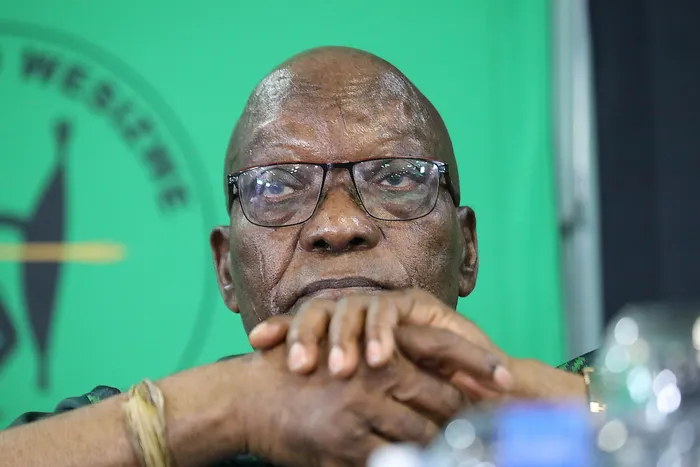
Jacob Zuma and the uMkhonto weSizwe Party will on Thursday challenge the Madlanga Commission in the Pretoria High Court.
Image: Independent Media
The uMkhonto weSizwe Party (MKP) and former president Jacob Zuma will argue in the Gauteng High Court in Pretoria on Thursday that the newly established Madlanga Commission unlawfully oversteps the powers of South Africa’s judicial oversight bodies.
In an urgent court application, Zuma and his party are seeking to interdict the commission’s work.
They stress that they are not opposing the creation of a commission of inquiry in principle, but are specifically objecting to this one, given its mandate and structure.
Their main concern centres on the fact that the commission, led by Constitutional Court Justice Mbuyiseli Madlanga, has been tasked with investigating serious allegations of criminal activity within the judiciary.
The two argue that this creates a clear conflict of interest.
“The judiciary cannot be both an accused institution and the investigating body via one of its own members,” Zuma and the MKP said in court papers.
They argue that this breaches the legal principle that no one should be a judge in their own cause.
They claim the commission’s terms of reference intrude on the exclusive constitutional powers of the Judicial Service Commission (JSC) and the Magistrates Commission, bodies specifically tasked with handling judicial misconduct.
Alongside their objection to the commission itself, Zuma and the MKP are also challenging President Cyril Ramaphosa’s decision to place Police Minister Senzo Mchunu on special leave and appoint Professor Firoz Cachalia in an acting capacity.
These decisions, they argue, are unconstitutional, irrational, and breach the president’s oath of office.
President Cyril Ramaphosa announced the formation of the judicial commission of inquiry in July. It was set up to investigate claims of criminal syndicate infiltration into South Africa’s law enforcement, intelligence, and judicial systems.
The explosive allegations were first made public by KwaZulu-Natal provincial police commissioner Lieutenant General Nhlanhla Mkhwanazi, who accused politicians, law enforcement officials, prosecutors, and judges of colluding with organised crime syndicates, including drug cartels.
Zuma and the MKP argue the commission is an “extremely expensive” initiative unlikely to deliver meaningful outcomes or accountability.
The commission has been allocated a R147.9 million budget for over six months.
They also argue that keeping Mchunu on extended leave will place an unnecessary financial burden on taxpayers.
Zuma and MK Party insist that appointing a sitting judge to lead an investigation into the judiciary is constitutionally inappropriate, given the risk of bias.
The subject matter, they say, falls squarely under the jurisdiction of the JSC and Magistrates Commission, not a judicial commission appointed by the executive.
However, Ramaphosa has defended the move, arguing the commission does not replace or override the JSC’s role but rather works in parallel.
He also maintains that the allegations made by Mkhwanazi do not identify specific judges or instances of misconduct that would immediately fall under the JSC’s mandate.
If such evidence arises, he said, it will be referred to the appropriate body.
The MKP has also staged protests against the inquiry in the days leading up to its expected start.
IOL